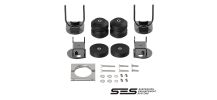Recreational Vehicle (RV) towing involves more than just attaching a trailer to a vehicle. It's about understanding the dynamics of safe and efficient transportation. From the type of hitch needed to the importance of weight distribution, RV Towing is a skill that requires knowledge and the right tools. Whether planning a weekend getaway or a cross-country adventure, mastering the art of RV towing ensures a smoother, safer journey. This guide will cover the basics, helping beginners confidently navigate the towing world.
Rigid Hitch Inc. – Your Partner in Reliable Towing Solutions
When it comes to reliable towing solutions, Rigid Hitch Inc. stands out as a leader. As a manufacturer and warehouse distributor, we specialize in trailer hitches, towing accessories, trailer parts, and truck accessories. Our products cater to towing needs, from light-duty excursions to heavy-duty tasks. At Rigid Hitch Inc., we understand that the key to successful RV towing lies in quality equipment and informed choices. We offer a wide array of products designed to enhance your towing experience, ensuring safety and reliability on the road.
Selecting the Right Tow Vehicle for Your RV
When selecting a tow vehicle for your RV, several factors must be carefully considered. You must assess your RV's weight and towing requirements. The weight of your RV, including all its contents, determines the minimum towing capacity your vehicle must have. If you need more clarification about your RV's weight, consult the manufacturer's specifications or have it professionally weighed.
Next, take into account the terrain you plan to travel. A more robust tow vehicle with ample power and stability is essential if you'll traverse steep hills, mountainous regions, or rough terrain. Your tow vehicle should have the necessary horsepower and torque to handle the added load of the RV. Four-wheel-drive cars are often preferred for better traction and control in challenging conditions.
Consider the vehicle's towing capacity, which is the maximum weight it can safely tow. Ensure that the vehicle you select exceeds your RV's total weight, providing a safety margin. Also, remember any additional cargo or passengers you plan to carry in the towed vehicle.
Lastly, assess your budget and preferences. Tow vehicles come in various sizes and types, from trucks and SUVs to dedicated towing vehicles. Choose one that aligns with your budget and offers the comfort and features you desire for your travels.
Essential Towing Equipment for RVs
Ensure that your hitch is compatible with both your tow vehicle and your RV. Choose the appropriate hitch class and weight rating to match your RV's weight and towing requirements. A weight-distributing hitch may be necessary for larger RVs to maintain balance and control during towing.
Towing mirrors are another essential accessory. They provide an extended field of view, allowing you to see behind and alongside your RV. Properly adjusted towing mirrors enhance safety by reducing blind spots and improving your ability to change lanes and merge onto highways.
Safety chains are a critical component of RV towing. They serve as a secondary connection between the RV and tow vehicle in case the hitch fails. Ensure that the safety chains are properly rated for your RV's weight and are crossed under the hitch to prevent the tongue from dropping to the ground in case of a disconnection.
Brake controllers are essential for RVs with trailer brakes. These controllers allow you to apply the trailer's brakes independently of the tow vehicle, improving braking performance and safety. Ensure the brake controller is properly calibrated to match your RV's weight and braking system.
Tips for Safely Connecting Your RV to the Tow Vehicle
Confirm that your hitch ball matches the trailer's coupler size. Using the wrong size can lead to improper connections and potential detachment while towing. Ensure the hitch ball is securely tightened to the ball mount, following the manufacturer's specifications.
Double-check the safety chains, which serve as a crucial backup in case the hitch fails. Cross the chains below the hitch to prevent the trailer tongue from dropping to the ground in the event of a disconnection. Ensure that the safety chains are properly rated for your RV's weight, and keep them taut but not overly tight to allow for proper articulation.
Verify that the breakaway system is functioning correctly. The breakaway system is a vital safety feature that applies to the trailer's brakes in case of an emergency or hitch failure. Test it to ensure it engages as expected.
Inspect the lighting connections to ensure all signals, including brake lights, turn signals, and running lights, are functioning correctly. Ensure that the electrical plug from the trailer is securely connected to the tow vehicle, and no wires are frayed or damaged. Proper lighting is essential for communication with other drivers on the road.
Driving Techniques for Towing an RV
Driving techniques for towing an RV differ from driving a regular vehicle and require heightened awareness and caution. Here are some essential tips to ensure safe towing:
Maintain a safe following distance from the vehicle in front of you. Towing a heavy RV increases your stopping distance, allowing extra space to react to sudden stops or emergencies.
Be aware of your vehicle's extended length when changing lanes or merging onto highways. Use your towing mirrors to monitor traffic alongside and behind the RV. Always signal your intentions well in advance.
Practice smooth and gradual acceleration and deceleration to avoid jerky movements that can lead to instability. Sudden acceleration or braking can cause swaying or fishtailing, especially in windy conditions.
Use lower gears when descending steep hills to control your speed and reduce strain on the vehicle's brakes. Avoid riding the brakes continuously, as it can lead to overheating.
Practice maneuvering and backing up in open areas before navigating tight campgrounds or parking lots. RVs have a larger turning radius, so be prepared for wider turns and plan your route accordingly.3
Take Action with Rigid Hitch Inc.
Ready to get on your RV towing adventure? Rigid Hitch Inc. is here to provide everything you need. From top-of-the-line tow accessories to expertly crafted trailer hitches, we have the solutions to meet all your towing requirements. Our extensive range of products ensures that you have the right equipment for the task, whether you're towing a small trailer for a weekend trip or a more significant load for a longer journey. Trust Rigid Hitch Inc. for quality, durability, and performance. Visit our website or contact us today to find the perfect towing solutions for your next adventure.
-Happy Towing













